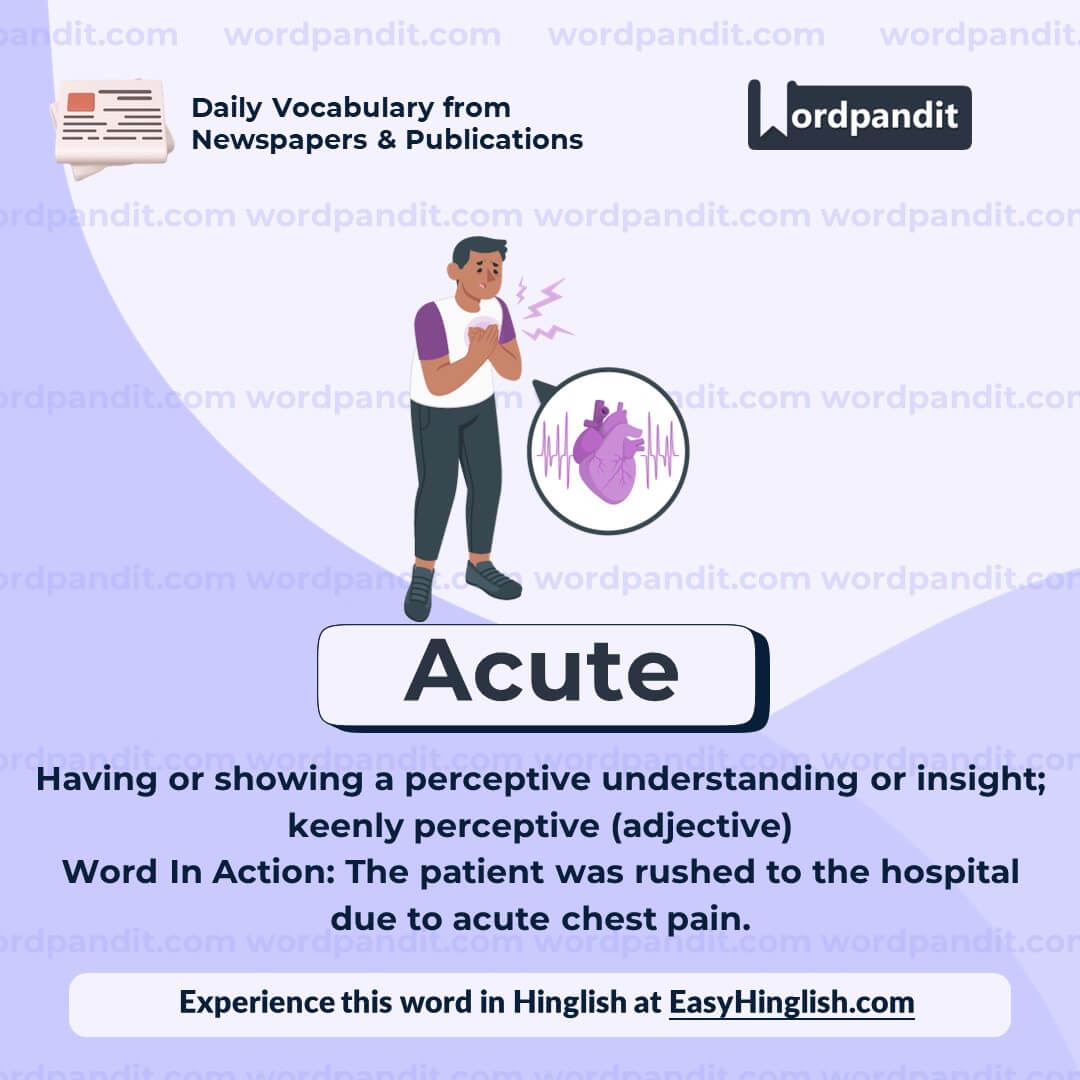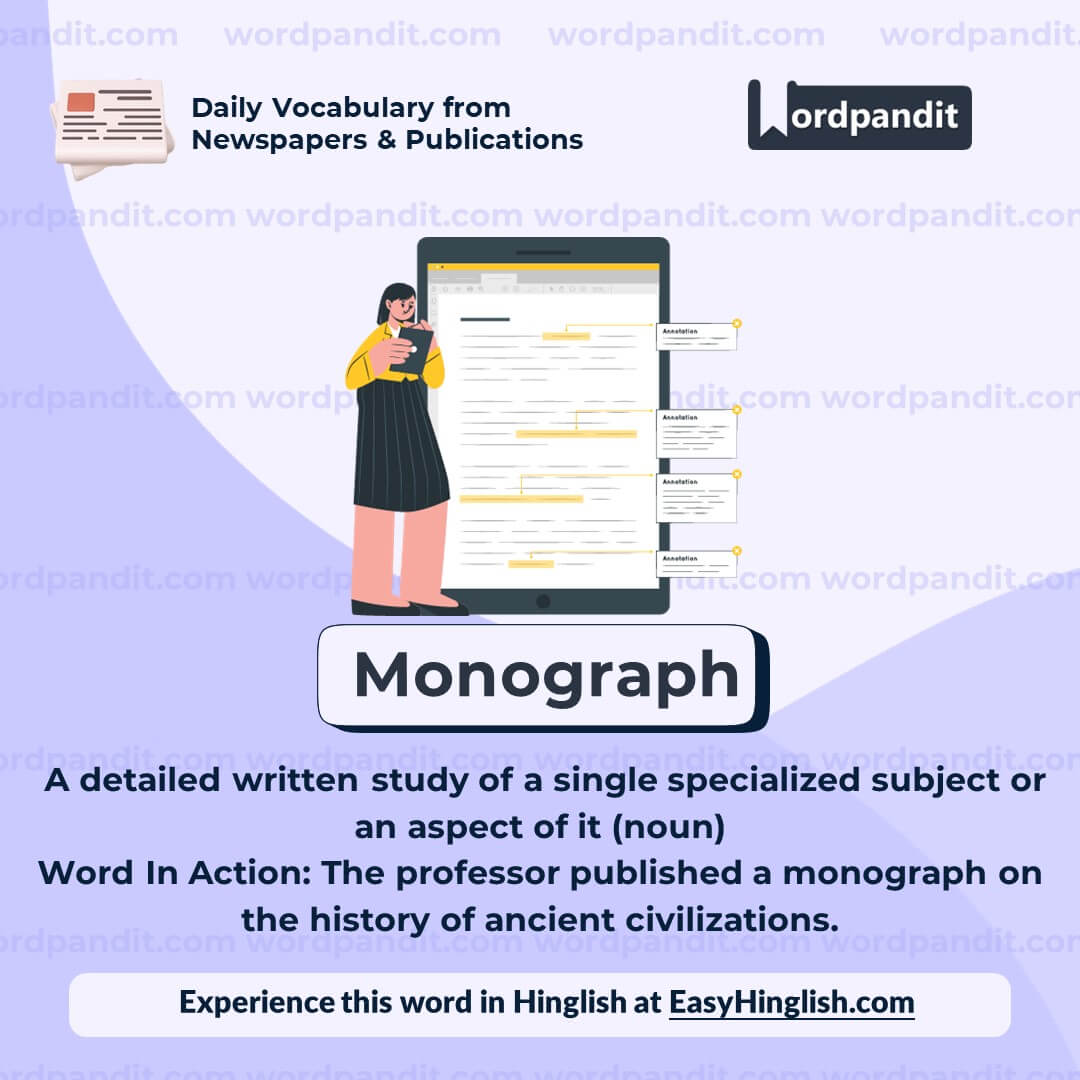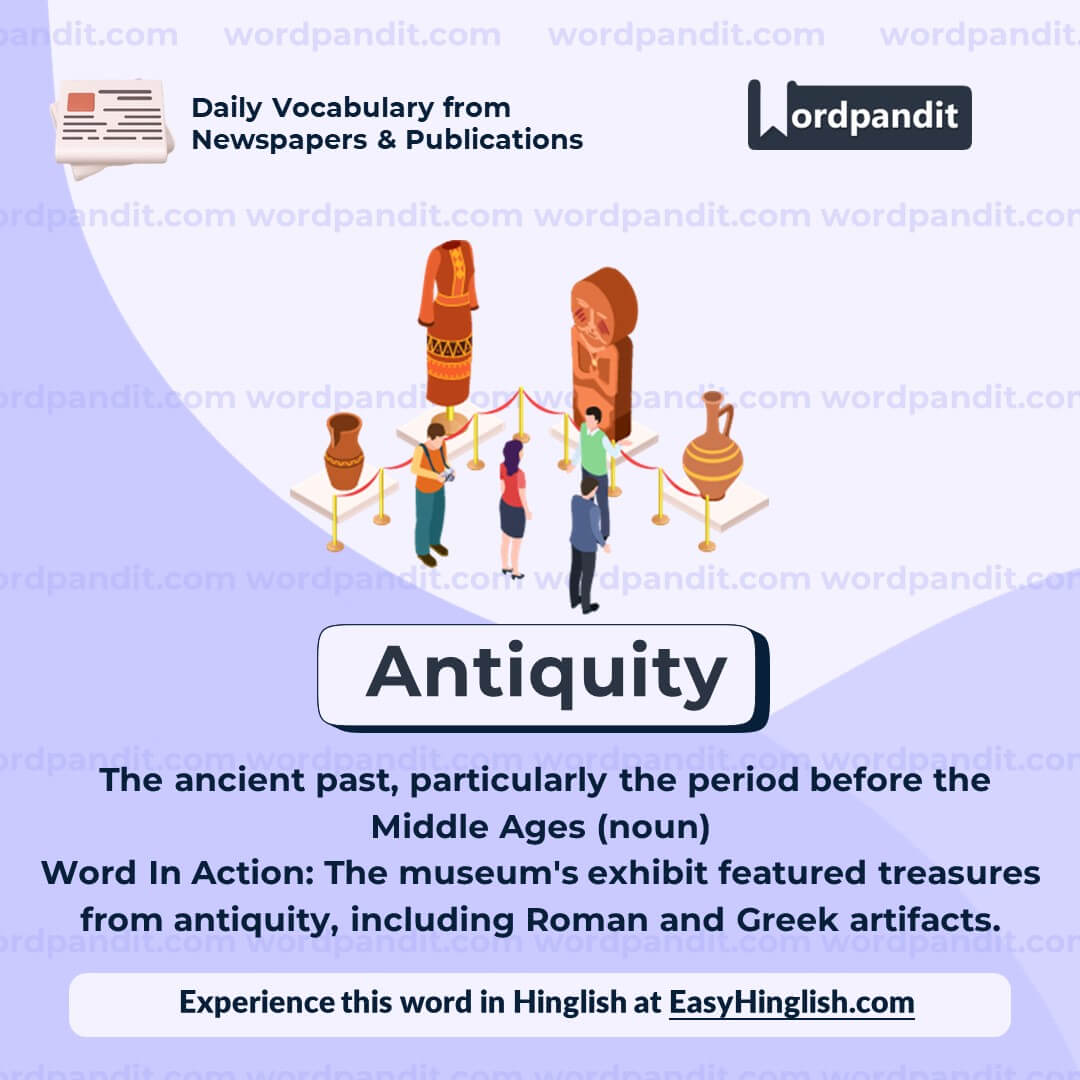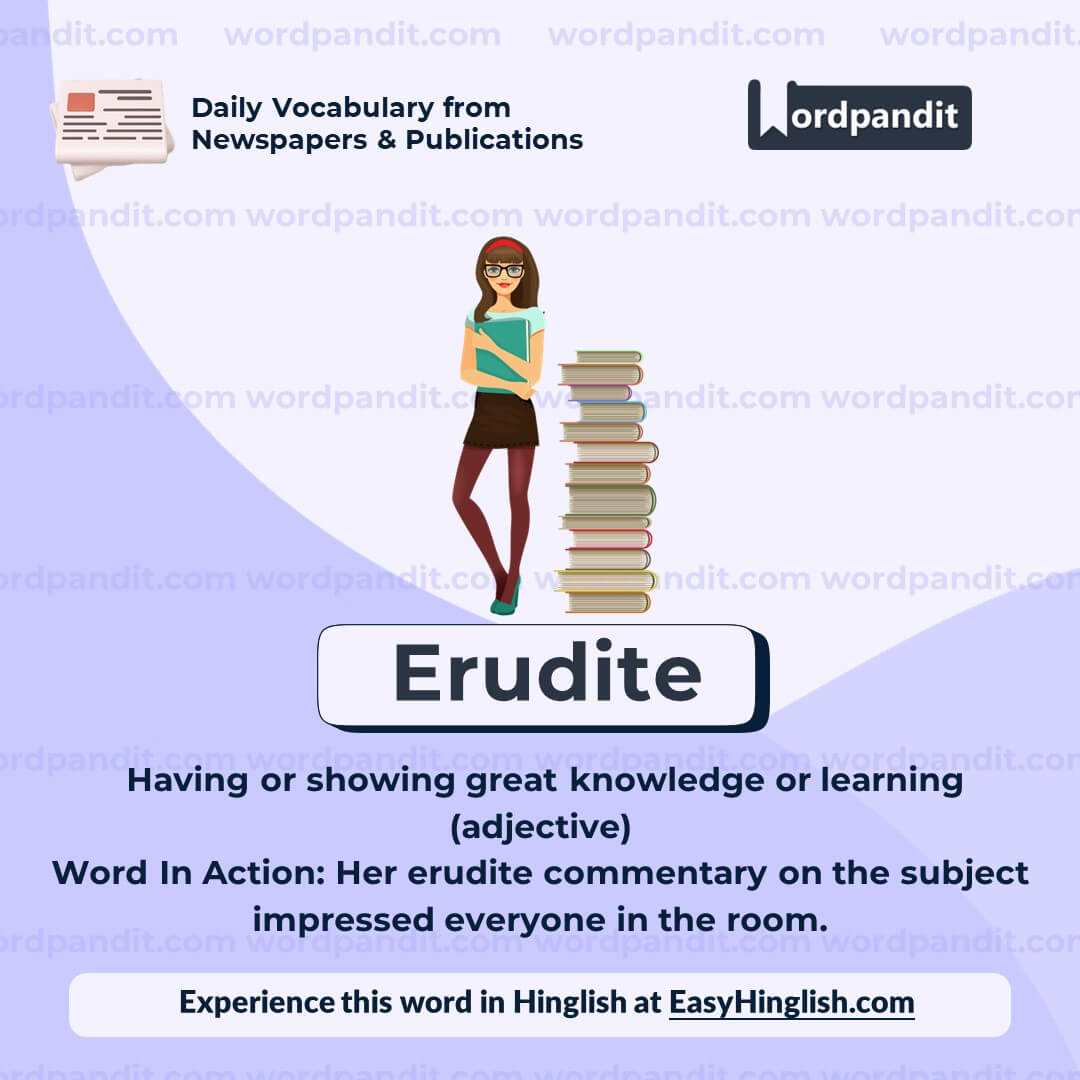Daily Vocabulary from International Newspapers and Publications
Expand Your Vocabulary with Wordpandit’s Global Vocabulary Hub
At Wordpandit, we are committed to helping you develop a truly global vocabulary by drawing from some of the most respected international publications. This section is designed to keep you ahead of the curve by introducing you to words that define global conversations and trends.
The Power of Global Sources
To help you think and communicate on a global scale, we curate vocabulary from renowned international sources, such as:
- The New York Times
- The Washington Post
- BBC
- The Guardian
- The Economist
- Scientific American
- Psychology Today
- And many more...
Stay Global, Stay Competitive
Our daily updates from international publications ensure you are consistently exposed to new words that reflect global news and developments, making sure your vocabulary is not only current but also globally relevant.
Enhance Your Global Perspective
Whether you’re preparing for international exams, aiming to excel in global business communication, or want to enhance your language skills for personal growth, Wordpandit offers the resources you need to thrive in a global context.
Effective Learning, Global Reach
Our learning methodology combines global examples, memory aids, and interactive activities, allowing you to internalize new words effectively and apply them in real-world scenarios.
Begin Your Global Vocabulary Journey Now!
Why Choose Wordpandit?
Practical Learning: Focus on words you'll actually encounter in real-world reading, enhancing your comprehension and communication skills.
Diverse Content: From current affairs to scientific breakthroughs, our varied sources expose you to vocabulary across multiple domains.
Effortless Integration: Make Wordpandit a part of your daily routine. Just a few minutes each day can significantly boost your lexicon over time.
Your Path to Vocabulary Mastery
- Visit our Daily Vocabulary section regularly
- Explore new words and their usage in context
- Practice incorporating these words into your own writing and speech
- Track your progress as your vocabulary expands
Start Your Journey Today
Embark on your vocabulary enhancement journey with Wordpandit. By consistently engaging with our daily posts, you'll build a robust vocabulary that serves you well in academic, professional, and personal contexts.
Remember, a word a day keeps linguistic limitations at bay. Make Wordpandit your daily companion in the quest for vocabulary excellence!
WORD-1: Acute
Context:
"That the book had been ‘too successful for his own comfort’, creating a ‘vehement’ debate in a ‘confused and complicated scene’. Still, he was acutely aware that historical narratives are read differently in different contexts, since – as a historian" - Aeon
Explanatory Paragraph:
The word "acute" is often used to describe something that is intense, severe, or sharp in effect. It can refer to a heightened sense of awareness, a sharp angle in geometry, or a situation or condition that requires immediate attention. In the provided context, it conveys a heightened awareness or perception.
Meaning: Having or showing a perceptive understanding or insight; keenly perceptive (adjective).
Pronunciation: ah-KYOOT
Difficulty Level: ⭐⭐ Intermediate
Etymology: From Latin "acutus," meaning "sharp" or "pointed."
Synonyms & Antonyms:
Synonyms: Keen, sharp, intense, perceptive, severe
Antonyms: Blunt, dull, mild, oblivious
Usage Examples:
- Her acute sense of smell made her an excellent perfume tester.
- The patient was suffering from acute chest pain and needed immediate care.
- His acute observations during the meeting helped identify the problem quickly.
- The acute angle formed by the two lines measured less than 45 degrees.
Cultural Reference:
"Acute" is often referenced in medical dramas to describe a condition that requires immediate attention, such as "acute respiratory distress syndrome," emphasizing its severity and urgency.
Think About It:
How does being acutely aware of one’s surroundings contribute to personal safety and success?
Quick Activity:
Write three sentences describing situations where someone might demonstrate acute awareness, using the word correctly.
Memory Tip:
Think of an "acute" triangle in geometry, which has sharp angles. Similarly, "acute" means sharp or intense in other contexts.
Real-World Application:
"Acute" is frequently used in medical, mathematical, and everyday contexts to describe conditions or observations that are sharp, severe, or require immediate attention. Recognizing its use can help in understanding descriptions of urgency or sharpness in various fields.
WORD-2: Monograph
Context:
"In the two-fold division described above, his substantive monographs and his methodological writings are typically mapped separately within Pocock’s impressive production and often presented as independent from one another." - Aeon
Explanatory Paragraph:
A "monograph" is a detailed and specialized piece of writing on a single subject, often produced by an expert in the field. Unlike general books, monographs aim to delve deeply into one topic, providing a comprehensive analysis or study. The term is frequently used in academic and scholarly contexts to describe works that contribute to specialized knowledge.
Meaning: A detailed written study of a single specialized subject or an aspect of it (noun).
Pronunciation: MON-uh-graf
Difficulty Level: ⭐⭐⭐ Advanced
Etymology: From Greek "monos," meaning "single," and "grapho," meaning "to write."
Synonyms & Antonyms:
Synonyms: Treatise, dissertation, study, essay, thesis
Antonyms: Compilation, anthology, general overview
Usage Examples:
- The professor’s latest monograph examines the influence of colonialism on modern political structures.
- She spent years conducting research for her monograph on marine biodiversity.
- His monograph on Shakespearean tragedy is widely regarded as a definitive work in the field.
- The library houses an extensive collection of monographs on ancient civilizations.
Cultural Reference:
Monographs are an essential component of academic publishing. For instance, the works of historians like Fernand Braudel often take the form of detailed monographs that deeply explore specific aspects of history.
Think About It:
Why might an academic choose to write a monograph instead of a general book for a wider audience?
Quick Activity:
Think of a topic you are passionate about and outline how you would structure a monograph to explore it in detail.
Memory Tip:
Break down the word: "Mono" means single, and "graph" relates to writing. A monograph is a single-focused piece of writing.
Real-World Application:
Monographs are used by experts to share in-depth research and findings on specific topics, playing a crucial role in advancing knowledge in fields such as science, history, and literature. They are also instrumental in academic career progression.
WORD-3: Antiquity
Context:
"Namely, from classical antiquity to Renaissance Florence, early modern England and colonial America." - Aeon
Explanatory Paragraph:
The term "antiquity" refers to the distant past, especially the period before the Middle Ages, characterized by ancient civilizations like those of Greece and Rome. It is often associated with historical artifacts, cultural practices, and knowledge from ancient times. The word can also denote the state of being ancient.
Meaning: The ancient past, particularly the period before the Middle Ages (noun).
Pronunciation: an-TIH-kwih-tee
Difficulty Level: ⭐⭐ Intermediate
Etymology: From Latin "antiquitas," meaning "ancient times," derived from "antiquus," meaning "old" or "ancient."
Synonyms & Antonyms:
Synonyms: Ancient times, classical era, bygone age
Antonyms: Modernity, contemporary times, present day
Usage Examples:
- The museum's collection of artifacts from antiquity includes sculptures and pottery from ancient Greece.
- Her studies focus on the literature and philosophy of classical antiquity.
- The ruins of the ancient city stood as a testament to the grandeur of antiquity.
- Exploring the customs of antiquity reveals the origins of many modern traditions.
Cultural Reference:
Classical antiquity is often celebrated in Western culture for its contributions to art, literature, and governance. The Renaissance, for example, was inspired by a revival of ideas and aesthetics from ancient Greece and Rome.
Think About It:
Why do you think studying antiquity is important for understanding modern civilizations and cultures?
Quick Activity:
List three key contributions from antiquity that have influenced modern society, explaining their significance.
Memory Tip:
Remember "antiquity" by associating it with "antique" objects, which are old and from the distant past, just like antiquity refers to ancient times.
Real-World Application:
Antiquity is a crucial concept in history, archaeology, and art. It provides insights into the origins of governance, philosophy, and artistic expressions that continue to shape contemporary society.
WORD-4: Integral
Context:
"Contestation of political identities as an integral part of the history of the British peoples and conceived of British history as the history of several nations interacting with an imperial state." - Aeon
Explanatory Paragraph:
The word "integral" refers to something that is essential or necessary to make a whole complete. It indicates that a particular component is indispensable for the functioning, structure, or existence of a system or concept. In the context provided, it suggests that political identity is a crucial and inseparable aspect of British history.
Meaning: Necessary to make a whole complete; essential or fundamental (adjective).
Pronunciation: IN-teh-gruhl or in-TEH-gruhl
Difficulty Level: ⭐⭐ Intermediate
Etymology: From Latin "integer," meaning "whole" or "untouched."
Synonyms & Antonyms:
Synonyms: Essential, fundamental, indispensable, necessary
Antonyms: Nonessential, extraneous, optional, superfluous
Usage Examples:
- Effective teamwork is an integral part of a successful project.
- Nutrition is integral to maintaining good health.
- Language plays an integral role in shaping cultural identity.
- The integral components of the machine must be carefully aligned for it to function properly.
Cultural Reference:
The concept of being integral is often highlighted in mathematics, where integral calculus deals with the idea of integration, bringing together smaller parts to understand the whole. This mirrors the word's meaning in other contexts, emphasizing the importance of unity and completeness.
Think About It:
What are some integral aspects of your personal or professional life that you consider indispensable for success?
Quick Activity:
Write a paragraph describing an integral quality or trait that contributes to strong leadership.
Memory Tip:
Link "integral" to "integrate"—if something is integral, it’s integrated into the whole and cannot be separated without causing incompleteness.
Real-World Application:
In the real world, "integral" is used to describe key components in various fields: ethics are integral to law, reliability is integral to engineering, and compassion is integral to healthcare. Recognizing integral elements helps in understanding what makes systems or concepts work effectively.
WORD-5: Erudite
Context:
"And it is famous for its evocative style and erudite character." - Aeon
Explanatory Paragraph:
The term "erudite" describes someone who is highly knowledgeable or learned, often as a result of extensive reading and study. It is frequently used to characterize individuals, works, or styles that reflect deep intellectual understanding and scholarship. In the context provided, it suggests that the subject is distinguished by its scholarly or learned qualities.
Meaning: Having or showing great knowledge or learning (adjective).
Pronunciation: AIR-yoo-dyte or ER-yoo-dyte
Difficulty Level: ⭐⭐⭐ Advanced
Etymology: From Latin "eruditus," meaning "instructed" or "learned," derived from "erudire," meaning "to polish" or "educate."
Synonyms & Antonyms:
Synonyms: Scholarly, learned, intellectual, knowledgeable
Antonyms: Ignorant, uneducated, uninformed
Usage Examples:
- Her erudite lectures on philosophy captivated the audience with their depth and clarity.
- The professor's erudite analysis of the text revealed hidden layers of meaning.
- He is known for his erudite commentary on classical music.
- The erudite tone of the article made it an authoritative source on the subject.
Cultural Reference:
The term "erudite" gained popular recognition in modern times through its use in the "Divergent" series by Veronica Roth, where the Erudite faction represents individuals who prioritize knowledge and intellectual achievement.
Think About It:
How does one balance being erudite and approachable in communication?
Quick Activity:
List three qualities that you think are essential for someone to be considered erudite. Explain why.
Memory Tip:
Think of "erudite" as someone who has been "educated" to the point of being polished and refined in knowledge.
Real-World Application:
The term "erudite" is often used to describe experts, educators, and authors who exhibit deep understanding in their fields. Recognizing and striving for erudition can lead to intellectual growth and respect in professional and academic settings.


















